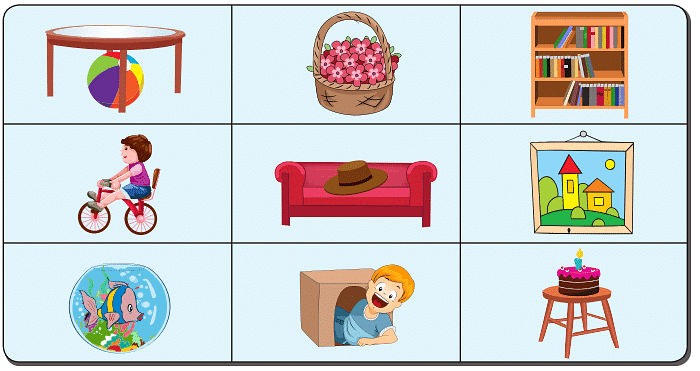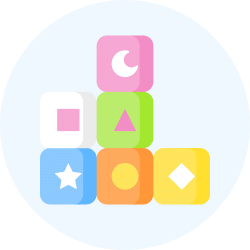LKG Exam > LKG Notes > English for LKG > Worksheet Solutions: Positions - 2
Worksheet Solutions: Positions - 2 | English for LKG PDF Download
Q1: Fill in the blanks using the words given in brackets ( In, On or Under).
(i) The ball is _______ the table. (in/on/under)
Ans: under
(ii) The boy is _______ the bicycle. (in/on/under)
Ans: on
(iii) The fish is _______ the bowl. (in/on/under)
Ans: in
(iv) The flowers are _______ the basket. (in/on/under)
Ans: in
(v) The hat is _______ the sofa. (in/on/under)
Ans: on
(vi) The boy is _______ the box. (in/on/under)
Ans: in
(vii) The books are _______ the shelf. (in/on/under)
Ans: on
(viii) The frame is _______ the wall. (in/on/under)
Ans: on
(ix) The cake is _______ the table. (in/on/under)
Ans: on
The document Worksheet Solutions: Positions - 2 | English for LKG is a part of the LKG Course English for LKG.
All you need of LKG at this link: LKG
|
70 videos|145 docs|3 tests
|
FAQs on Worksheet Solutions: Positions - 2 - English for LKG
| 1. What is the importance of understanding positions in early childhood education? |  |
Ans. Understanding positions in early childhood education is important because it helps children develop spatial awareness, problem-solving skills, and fine motor skills. It also helps them understand concepts like up, down, front, back, and left, right, which are important for their overall cognitive development.
| 2. How can teachers incorporate positional concepts into their lessons? |  |
Ans. Teachers can incorporate positional concepts into their lessons by using visual aids, such as pictures or objects, to demonstrate different positions. They can also engage children in hands-on activities, like arranging blocks or toys in different positions, to reinforce their understanding. Additionally, teachers can use songs, rhymes, and games that involve positional concepts to make learning fun and engaging.
| 3. At what age do children start understanding positional concepts? |  |
Ans. Children start understanding positional concepts around the age of 2 to 3 years old. At this stage, they begin to recognize and use simple positional words like "up," "down," "in," and "out." As they grow older, their understanding becomes more complex, and they can grasp concepts like behind, under, between, and next to.
| 4. What are some activities parents can do at home to teach positional concepts to their children? |  |
Ans. Parents can teach positional concepts to their children at home through various activities. They can play hide-and-seek games, where children have to find objects based on positional clues. They can also create obstacle courses or scavenger hunts that require children to move and position themselves in different ways. Additionally, reading books or watching videos that focus on positional concepts can help reinforce learning.
| 5. How can understanding positions benefit children in their daily lives? |  |
Ans. Understanding positions can benefit children in their daily lives in several ways. It helps them navigate their environment and follow directions more effectively. For example, understanding left and right can help them follow instructions while getting dressed or crossing the road. It also enhances their problem-solving skills as they learn to visualize and manipulate objects in different positions. Overall, understanding positions promotes their overall spatial awareness and cognitive development.
Related Searches















